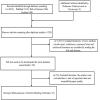Association of vitamin E intake in diet and supplements with risk of dementia: A meta-analysis
- PMID: 35978949
- PMCID: PMC9376618
- DOI: 10.3389/fnagi.2022.955878
Association of vitamin E intake in diet and supplements with risk of dementia: A meta-analysis
Abstract
Background: Dementia is a chronic progressive neurodegenerative disease that can lead to disability and death in humans, but there is still no effective prevention and treatment. Due to the neuroprotective effects of vitamin E, a large number of researchers have explored whether vitamin E can reduce the risk of dementia. Some researchers believe that vitamin E can reduce the risk of dementia, while others hold the opposite conclusion. We therefore performed a meta-analysis to clarify the relationship between them.
Methods: We searched PubMed, Embase, and Web of Science databases for articles on the connection of dietary and supplementation vitamin E with dementia risk from inception through April 2022 using the main keywords "dementia," "Alzheimer's disease," "vitamin E," and "tocopherol," and used a random-utility model for pooled effect sizes. Odds ratios (OR) and 95% confidence intervals were derived using lower and higher doses as contrasts. Obtained data were shown and assessed using Stata12.0 free software.
Results: We included 15 articles in sum. Among them, there were nine articles containing AD. By comparing the highest intake with the lowest intake, Combined ORs for high intake were as follows: dementia (OR = 0.79, 95% CI 0.70-0.88 I 2 = 35.0%), Alzheimer's disease (OR = 0.78, 95% CI 0.64-0.94 I 2 = 36.9%). Subgroup analyses were also performed by study type, diet and supplementation, and NOS score.
Conclusions: High vitamin E intake from diet and supplements significantly reduces the risk of dementia and Alzheimer's disease.
Keywords: dementia; diet; meta-analysis; risk; supplements; vitamin E.
Copyright © 2022 Zhao, Han, Zhang, Liu, Zhang, Zhao, Jiang, Li, Cai and You.
Conflict of interest statement
The authors declare that the research was conducted in the absence of any commercial or financial relationships that could be construed as a potential conflict of interest.
Figures





Similar articles
-
Association of antioxidants intake in diet and supplements with risk of Alzheimer's disease: a systematic review and dose-response meta-analysis of prospective cohort studies.Aging Clin Exp Res. 2025 May 26;37(1):166. doi: 10.1007/s40520-024-02893-6. Aging Clin Exp Res. 2025. PMID: 40415164 Free PMC article.
-
Association of Dietary and Supplement Intake of Antioxidants with Risk of Dementia: A Meta-Analysis of Cohort Studies.J Alzheimers Dis. 2024;99(s1):S35-S50. doi: 10.3233/JAD-220909. J Alzheimers Dis. 2024. PMID: 36846999
-
B vitamins and prevention of cognitive decline and incident dementia: a systematic review and meta-analysis.Nutr Rev. 2022 Mar 10;80(4):931-949. doi: 10.1093/nutrit/nuab057. Nutr Rev. 2022. PMID: 34432056
-
Vitamin D deficiency as a risk factor for dementia and Alzheimer's disease: an updated meta-analysis.BMC Neurol. 2019 Nov 13;19(1):284. doi: 10.1186/s12883-019-1500-6. BMC Neurol. 2019. PMID: 31722673 Free PMC article.
-
Association between Dietary Vitamin E Intake and Esophageal Cancer Risk: An Updated Meta-Analysis.Nutrients. 2018 Jun 21;10(7):801. doi: 10.3390/nu10070801. Nutrients. 2018. PMID: 29933640 Free PMC article.
Cited by
-
No genetic causal association between circulating alpha-tocopherol levels and osteoarthritis, a two-sample Mendelian randomization analysis.Sci Rep. 2024 May 2;14(1):10099. doi: 10.1038/s41598-024-60676-5. Sci Rep. 2024. PMID: 38698019 Free PMC article.
-
Association of antioxidants intake in diet and supplements with risk of Alzheimer's disease: a systematic review and dose-response meta-analysis of prospective cohort studies.Aging Clin Exp Res. 2025 May 26;37(1):166. doi: 10.1007/s40520-024-02893-6. Aging Clin Exp Res. 2025. PMID: 40415164 Free PMC article.
-
Association of Vitamin E and Cognitive Decline in Older Adults with and without the APOEɛ4 Allele: A Biracial Population-Based Community Study.J Alzheimers Dis. 2023;96(3):1129-1138. doi: 10.3233/JAD-230797. J Alzheimers Dis. 2023. PMID: 37955092 Free PMC article.
-
The Quest for Neurodegenerative Disease Treatment-Focusing on Alzheimer's Disease Personalised Diets.Curr Issues Mol Biol. 2023 Feb 9;45(2):1519-1535. doi: 10.3390/cimb45020098. Curr Issues Mol Biol. 2023. PMID: 36826043 Free PMC article. Review.
-
Associations between vitamin E status and bone mineral density in children and adolescents aged 8-19 years: Evidence based on NHANES 2005-2006, 2017-2018.PLoS One. 2023 Mar 16;18(3):e0283127. doi: 10.1371/journal.pone.0283127. eCollection 2023. PLoS One. 2023. PMID: 36928218 Free PMC article.
References
Publication types
LinkOut - more resources
Full Text Sources
Miscellaneous

